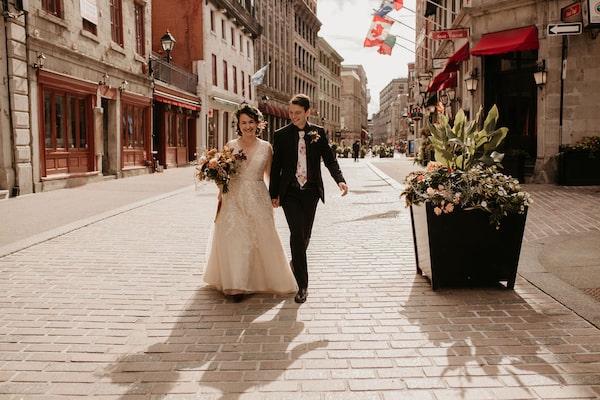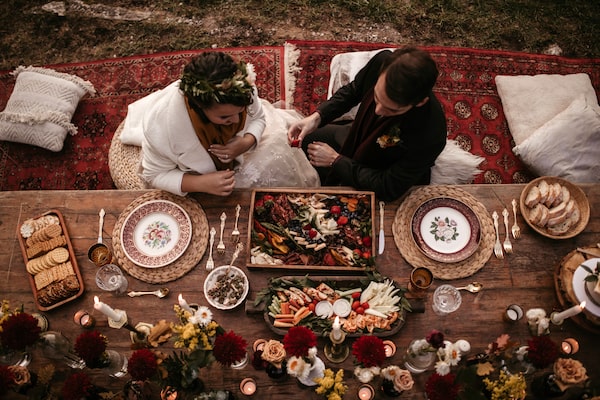Sign up for the weekly Parenting & Relationships newsletter for news and advice to help you be a better parent, partner, friend, family member or colleague.

Robyn Obermeyer and Kyle Birch eloped last October.ariann bt/Supplied
Robyn Obermeyer and Kyle Birch have planned three weddings in the past year. The first, for 85 people, was booked at La Toundra, in the heart of the Floralies Gardens with a panoramic view of Montreal. The second, for 25 close friends and family, was at La Maison Bohème, a lovely venue in Quebec’s Eastern Townships. The third – as the saying goes – was the charm. Tired of delays caused by on-again, off-again lockdowns, the couple, both 26 years old, eloped last October. They had a simple ceremony, in the woods, an hour’s drive from Montreal.
“When the day arrived, it was stunningly beautiful and so incredibly special, because for all the heartbreak we went through, we were so relieved to finally be getting married,” says Obermeyer, a communications manager with McMaster University in Hamilton. “We had three close friends who lived locally attend the ceremony, one of whom was the officiant.
“We livestreamed it and had a toast afterwards with everyone from home. Then we did some photos with our friends, wished them goodnight and had an intimate catered meal and a first dance by candlelight. We missed everyone so much, but it was an amazing experience – better than we ever imagined.”
How wedding vendors have channeled creativity and resiliency to weather the pandemic
How four couples creatively tied the knot during the pandemic
By changing what’s possible in terms of weddings – because of lockdowns, attendance rules and travel restrictions – COVID-19 has forced engaged couples to reconsider what is truly important about their big day. Rather than the grand, lavish affairs typical of Canada’s $5-billion-a-year wedding industry, talk is turning to micro-weddings, elopements, altruism and whether it’s really worth registering for fancy cutlery.
There are signs of this “wedding day reckoning” everywhere. Elopements appear to be up, with new companies such as Toronto-based Pop-Up Chapel Co. and Kelowna, B.C.-based Elope BC selling out dates for 2021 in the Okanagan, Vancouver, Winnipeg, Hamilton, Toronto and Ottawa as soon as they are posted. Up to 10 couples get married on the same day, sharing a venue, bouquet, decor, photographer and music – which has the added appeal of making a wedding a far more sustainable event. (The average wedding produces 181 kilograms of garbage and 63 metric tons of CO2, according to the book The Green Bride Guide.)
“Our wedding season was effectively cancelled in 2020, but we found some creative alternatives for some of our couples to get married,” says Nadine Topuzogullari, owner of Le Coeur Bohème in Montreal, which did Obermeyer’s woodland-themed nuptials. “We started doing elopements and pop-up wedding packages for 10 guests or less, which come with flowers, decor, cocktails and a catered meal.
“Thankfully, we did about 10 of these small, socially distanced weddings, which might not have been what our couples first envisioned, but ended up being perfect in their own way,” Topuzolgullari says. “Big weddings will come back … but I think micro-weddings will grow in popularity. It’s the substance of them, the coziness and the romance that couples love. Quite frankly, they seem to have more fun.”
Bridal registries, too, have changed during the pandemic. Whereas couples once registered for fine china and good silver, they’re now setting up online cash registries through sites such as Zola, Hitchd or Honeyfund to help pay for a down payment on a house or a honeymoon. Others are foregoing gifts altogether and asking guests to register with charity platforms such as the Good Beginning to start their married life on an altruistic note.
Even the way brides shop for wedding dresses has changed, with start-ups including Floravere, Anomalie and Lace & Liberty offering direct-to-consumer online options for choosing the perfect gown.
Michelle Bilodeau and Karen Cleveland, authors of The New Wedding Book: A Guide to Ditching all the Rules, applaud the changing sensibilities.

"It was an amazing experience – better than we ever imagined," says Obermeyer of her wedding day.ariann bt/Supplied
For years, they write, traditions chugged along as if feminism never happened, giving rise to “what sociologists have dubbed the wedding-industrial complex: a billion-dollar machine that is obsessed with and fetishizes how women look, as a gateway to being a wife and mother.”
In North America alone, the industry is worth US$70-billion. Estimates suggest that number balloons to around US$300-billion worldwide. A recent survey from BMO Financial Group found Canadian couples turn to savings and investments to front 60 per cent of their wedding costs.
“The idea that you have to dip into your savings just to have this ‘picture-perfect’ day is outdated and old-fashioned,” Cleveland says.
Adds Bilodeau: “To put a very fine point on it, due to the coronavirus there has been a colossal worldwide reckoning of just what is truly important. For the first time in generations, couples now have an alternate path they can take.”
Couples still want to have a special day, Cleveland says. “But they don’t want to spend the next five to 10 years paying it off.”
That was Chris Pihl and Steven Fulcher’s thinking when their destination wedding to Mexico was cancelled last April. Rather than postpone, they made the decision to elope.
“We wanted to get started on growing our family so getting married in 2020 was important to us,” says Pihl, 31, a hairstylist in Kelowna, B.C. “Every venue I tried was booked and then a client told me about Elope BC, which had one date left in December.
“We put on our suits, invited a few friends and family, and got married in front of a simple arbour by a river in the Okanagan. It was more beautiful than I imagined and it was affordable, too, which was nice,” he says. “Instead of spending $40,000, which was our budget for Mexico, we spent $3,000. We put the money we saved toward a new house.”
Obermeyer also has few regrets about her pared-down wedding – except one.
“The hardest thing for us was calling our loved ones and uninviting them from our wedding. It’s wrenching telling your parents that they can’t come. A lot of tears were shed that night.”
However, her pandemic wedding – with hand-written vows and a five-course picnic dinner under the stars – also gave her a wedding present that is priceless.
“My mom altered my dress, which she was supposed to bring with her to the wedding. When we cancelled, she shipped it to me,” Obermeyer says. “When I opened the box she had sewn two tiny heart-shaped beads onto the sleeve of my wedding dress with a note that said: ‘These are to represent me and your dad watching over your shoulder.’ That is a gift I will never be able to replicate.”